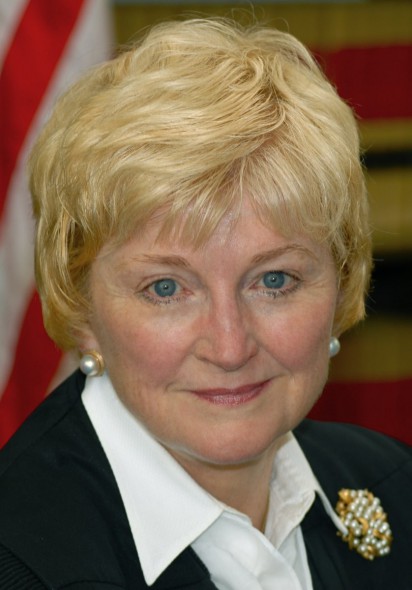Supreme Court Should Address Recusal Issue
State's top justices ignore voter concerns about campaign donations they get.
Wisconsin Supreme Court Chief Justice Patience Roggensack recently gave a lecture at Marquette University Law School during which she decried those who use “tough talk” when discussing the court because she believes doing so threatens the court’s “institutional legitimacy.” But Roggensack need not look any further than some of the court’s own members’ actions as reasons for the court’s decline in public confidence.
I believe in showing respect for the courts. As an attorney, I work within the criminal justice system and have the highest respect for the many hard-working judges who take the law very seriously and who act with dignity. But just as respect must be earned, it can also be sullied by actions that undermine confidence in what is supposed to be a fair and impartial, non-partisan judiciary.
At her lecture, Roggensack criticized former Wisconsin Supreme Court Justice Janine Geske, without mentioning her by name, but by quoting her. Geske previously said regarding the politicization of Wisconsin Supreme Court elections: “people lose faith that the court is anything but a political machine.” A little hyperbolic? Maybe. But Geske is right that the court seems to have become much more politicized.
Although the Wisconsin Supreme Court is officially non-partisan, most Wisconsinites don’t believe that notion for one second. A 2011 poll found only one-third of state residents have confidence in the court.
The reason for the lack of public confidence in the court seems clear — a flood of special-interest money and partisan spending on judicial campaigns.
A 2009 Public Policy poll found 91 percent of Wisconsin voters are concerned about special-interest group spending on ads for judicial elections and 72 percent believe campaign contributors influence judicial elections. The Center for Public Integrity examined the judicial financial disclosure of state courts across the United States and rated the Wisconsin Supreme Court as an “F.”
Wisconsinites have reason to be concerned about partisanship on the court. Judicial candidates viewed as politically “liberal” often receive campaign support from contributors that donate to Democrats, and vice versa for “conservative” candidates.
The issue of justices failing to recuse themselves in cases where it would appear, based on significant financial contributions from involved parties, that recusal is entirely appropriate, has been an area of significant criticism of the Wisconsin Supreme Court. A recent proposal signed by 54 retired judges calling on judges to recuse themselves where they have received more than a certain amount of campaign donations from a party appearing before them was scheduled to be discussed by the Wisconsin Supreme Court this past Thursday, but was taken off of the court’s agenda.
The justices ought to consider a system of public financing of judicial elections. A 2015 New York Times/CBS News poll found a majority of Republicans and Democrats favor overhauling the current system of unlimited money in elections by requiring disclosure of campaign contributors and restricting the amount of money that can be given by wealthy contributors. Although the 2007 members of the Wisconsin Supreme Court unanimously supported “realistic, meaningful public financing for Supreme Court elections to facilitate and protect the judicial function,” it seems the current majority make-up of the court would likely be unwilling to hold that same position.
The importance of an independent, non-partisan judiciary lies at the heart of the founding of the United States. In the Federalist Papers, Alexander Hamilton wrote about the vital nature of an independent judiciary to protect the people from legislative abuses. President Andrew Jackson once stated, “All the rights secured to the citizens under the Constitution are worth nothing, and a mere bubble, except guaranteed to them by an independent and virtuous Judiciary.”
Roggensack is correct when she calls on people to be judicious and not unfairly heap “tough talk” on the court. But actions speak louder than words, and “tough talk” is hardly the main problem here.
The court should look to its own members to refrain from accepting millions of dollars from partisan groups, set a tougher standard for recusal, and behave in ways that do not suggest a clear partisan political bent. Doing so would go a long way to restore confidence in the court.
Casey Hoff is a criminal defense attorney based in Sheboygan. This column was originally published by the Sheboygan Press.
Op-Ed
-
Wisconsin Candidates Decry Money in Politics, Plan to Raise Tons of It
 Dec 15th, 2025 by Ruth Conniff
Dec 15th, 2025 by Ruth Conniff
-
Trump Left Contraceptives to Rot; Women Pay the Price
 Dec 8th, 2025 by Dr. Shefaali Sharma
Dec 8th, 2025 by Dr. Shefaali Sharma
-
Why the Common Council’s Amended Budget is Good Policy for Milwaukee
 Nov 20th, 2025 by Alds. Marina Dimitrijevic and Russell W. Stamper, II
Nov 20th, 2025 by Alds. Marina Dimitrijevic and Russell W. Stamper, II




















